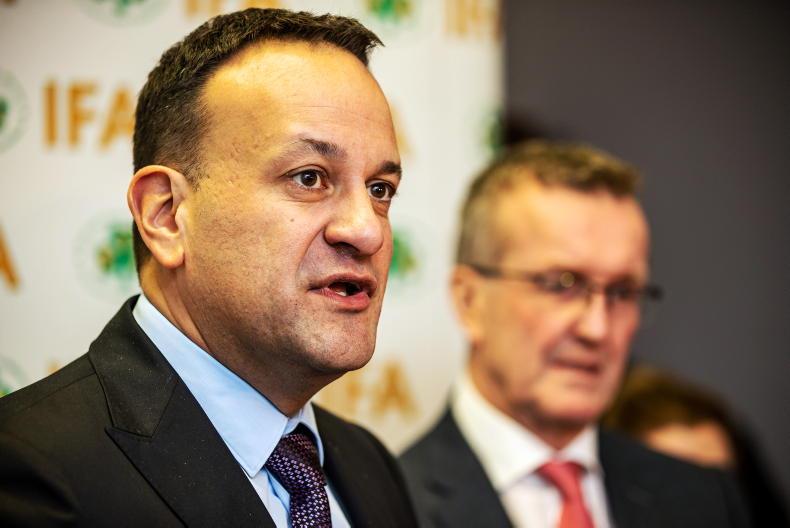Farmers will not be asked to bear a disproportionate burden of climate change mitigation, An Taoiseach Leo Varadkar told the IFA AGM on Tuesday.
He said the scale of the challenge to reach a 25% reduction in agricultural emissions is significant.
“I do not underestimate what it will ask of you and the sector. However, with your help and with you leading the way I believe it is achievable.
“Irish farmers are no strangers to change and have proven to be resilient and adaptable. We now understand the impacts of our combined actions on the world’s climate and on the natural world,” he said.
This is not the end of farming as we know it, he said, stating that farming practices and land use are constantly evolving.
“It is in the interests of Irish farmers to be at the centre of a decade of change, shaping it and driving it to achieve a genuinely sustainable food production sector.
“One that will protect farm incomes, the environment, and a way of life. One that involves new streams of income from energy production and carbon farming, forestry, organics and agri tourism,” he said.
He added that the completion of a land use review will provide further clarity for Irish farmers, foresters, fishers and the agri-food sector.

Forestry
Commenting on the joint venture between Coillte and Gresham House, he said that many, including the IFA, have expressed concerns about “the recent Coillte deal with a foreign fund”.
“I think there has been some misinformation with regard to that. Certainly no public land is going to be privatised and the State is part of the fund, a minority investor in the form of ISIF.
“It will account for roughly 1% of the additional forestry that we want to develop between now and 2050. But I want to be equally clear that this isn’t our preferred model going forward.
“Our preferred model is Coillte planting on State land and above all farmers, Irish farmers, planting on their own land.
“The Forestry Programme and the Climate Action Plan are designed so that farmers will have the biggest opportunity to meet our forestry targets, and to benefit from forestry payments.
“I believe we are on the cusp of a really exciting chapter in forestry for Ireland. For many farmers, forestry will be an activity that can complement existing farm activities to increase and diversify income,” he said.
Taoiseach Leo Varadkar tells @IFAmedia AGM that he is very aware of the challenges facing farm families and that farmers won't have to bear a disproportionate burden of climate action. @farmersjournal pic.twitter.com/1cHwiw7vyw
— Amy Forde (@amyforde6) January 24, 2023
He also asked the IFA “to actively encourage your members to consider forestry as part of your work”. This, he said, will benefit not just farmers but all of society and the rural economy.
Challenges
An Taoiseach said that the last few years have been challenging for farmers.
“Brexit, the pandemic, and Russia’s war in Ukraine have given rise to a lot of uncertainty.
“Despite good commodity prices for many sectors, significantly higher production costs have dampened returns for farmers considerably, with spiralling fertiliser, feed and fuel prices.
“However, I am very aware of the challenges facing farm families. They continue to cause a lot of worry and uncertainty.
“This Government will continue to stand with the sector through targeted interventions where and when they are most needed.
“Despite these challenges, Irish agri food has been performing well and the overall outlook remains positive. It remains positive because of your commitment to it. We must position ourselves though to deal with unexpected shocks. We must adjust quickly to the unavoidable and growing challenges,” he said.
Climate
The Fine Gael party leader said Ireland needs to move quickly to achieve the agreed Climate Action Plan measures such as making best use of chemical and organic fertilisers, maximising our natural advantage from grasslands, and improving animal breeding and feeding.
“We must also quickly build real opportunities for farmers to diversify their sources of income through the development of anaerobic digestion and expanded forestry, organics and tillage.
“Irish agri food has a great future. It can continue and will continue to produce world-class produce while improving environmental credentials and lowering emissions.”







 This is a subscriber-only article
This is a subscriber-only article










SHARING OPTIONS: